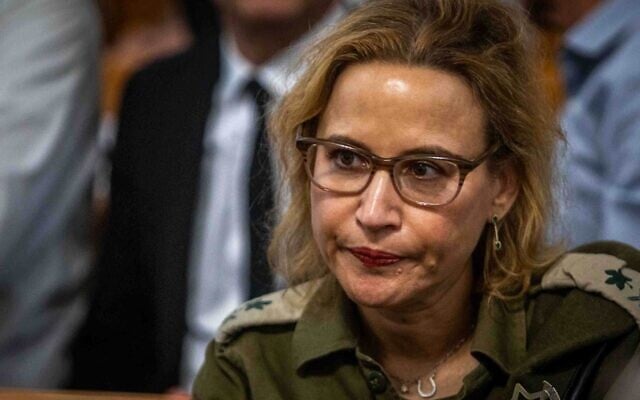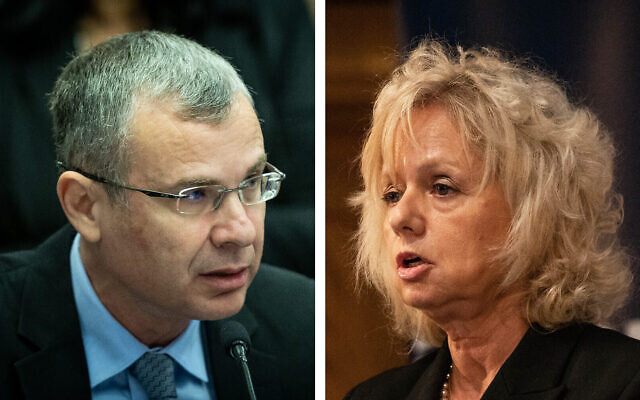Justice Minister Yariv Levin on Tuesday tapped State Ombudsman for Judges Asher Kula to head the investigation into former military advocate general Yifat Tomer-Yerushalmi over the Sde Teiman leak affair, in an effort to bypass Attorney General Gali Baharav-Miara.
Kula would lead the investigation in place of Baharav-Miara, who Levin has claimed is legally barred from involvement in the case due to her role and that of her office in drafting submissions to the High Court of Justice on behalf of the Military Advocate General’s Office that he said turned out to be inaccurate and even misleading.
Baharav-Miara has already insisted that Levin’s claims are baseless, and that the minister does not have the authority to bypass her. The clash between the two is likely to end up in the High Court.
Kula, a retired judge, issued a separate statement saying that his acceptance of the position did not reflect any position he might have over Levin’s efforts to sideline the attorney general.
Tomer-Yerushalmi is suspected of fraud and breach of trust, abuse of her office, obstruction of justice, and unlawful disclosure of material over her role in the Sde Teiman leak. She has admitted to authorizing the leak of surveillance camera footage in mid-2024 that purported to show alleged abuse of a Palestinian prisoner at the Sde Teiman detention facility.
Levin has claimed that a clause in the 1959 Law for the Civil Service (Appointments) allows a minister to empower an external public servant to take up a task of an official under that minister’s authority, if that official is legally prevented from carrying out that task, and in consultation with the civil service commissioner.

Writing to interim Civil Service Commissioner Daniel Hershkowitz on Tuesday, Levin informed him that he intends to appoint Kula to head the investigation instead of the attorney general, and noted that Kula had agreed to accept the role.
Kula was recently handpicked by the coalition to serve as the ombudsman for judges after the government passed legislation giving itself control over the appointment process.
“I believe that the ombudsman for judges, both as an institution and personally, is the best possible solution to what is required in this case,” wrote Levin. “His appointment will enjoy broad public trust, which is necessary in the circumstances in which we find ourselves.”
Kula said in his own press statement that his agreement to accept the role did not reflect any position he might have on the broader issue.
“The ombudsman does not express any position regarding the obstacles [to the involvement of] the attorney general [in the Sde Teiman leak investigation], nor regarding the authority of the minister,” a statement put out by the Justice Ministry’s spokesperson read.

Despite Levin’s assertion that he has the authority to sideline Baharav-Miara, some critics have pointed out that this could contravene Clause 34 of Basic Law: The Government, which states that “a minister who is in charge of implementing a law is entitled to assume any power, with the exception of powers of a judicial nature.”
In response to High Court petitions demanding a criminal investigation filed in August this year, the Attorney General’s Office helped draft a response, based on information related by the Military Advocate General’s Office, that an internal investigation had determined there was no likelihood of finding the leaker and that there was little point in further investigative steps.
That response was filed despite Tomer-Yerushalmi having personally approved the leak. Levin has argued that Baharav-Miara’s role in drafting the submission to the High Court contravened her involvement in the broader investigation, as well as that of every official in her office.
Likud MK Avichai Boaron has filed a petition to the High Court asking it to order the attorney general not to involve herself, although the court has yet to ask the parties for their response.
The liberal Israel Democracy Guard watchdog group filed a letter to Levin and Hershkowitz demanding that the effort to sideline Baharav-Miara cease, a likely precursor to filing a petition to the High Court with the same request.
Earlier on Tuesday, it was reported that the military prosecutor assigned to the Sde Teiman abuse case has been suspended over suspicions that he transferred surveillance camera footage to the Military Advocate General’s Office that was then leaked to the media.

Army Radio reported that the prosecutor, a lieutenant colonel, has been placed on forced leave until further notice. The IDF has not officially commented on the report.
The report said that the prosecutor was questioned under caution by the police over suspicions he was involved in the leak. As the prosecutor in the case, he had access to all the investigation materials, and he is suspected of providing them to officers in the MAG’s office for the leak to Channel 12 news in August 2024.
Army Radio reported that police have evidence showing that Tomer-Yerushalmi instructed her staff to ask the prosecutor for materials in order to pass them on to the media.
However, it remains unclear if the prosecutor knew that the material he handed over to the MAG’s office was intended to be leaked to the media, the report said.
Police divers were searching for Tomer-Yerushalmi’s phone at Hatzuk Beach in Tel Aviv on Tuesday morning. It has been missing since the former MAG disappeared on Sunday for several hours.
@YoavBorowitz
— כאן חדשות (@kann_news) November 4, 2025
At the time Tomer-Yerushalmi was feared to have harmed herself due to the ongoing investigation, but police now reportedly suspect her of intentionally tossing her phone into the sea in order to destroy incriminating evidence.

